Austrian skier Stephanie Venier edged Olympic champion Sofia Goggia to win her first World Cup in a crash-interrupted downhill race that was ended early on Sunday.
The race finished with 10 skiers still waiting to descend the Kandahar course after Federica Sosio became the seventh competitor to crash after a jump. The 24-year-old Sosio was taken to the local hospital by helicopter.
The Italian team said Sosio suffered a broken left leg. Federica Brignone, another to crash at the same spot, was also hospitalized but tests showed no damage to her right knee.
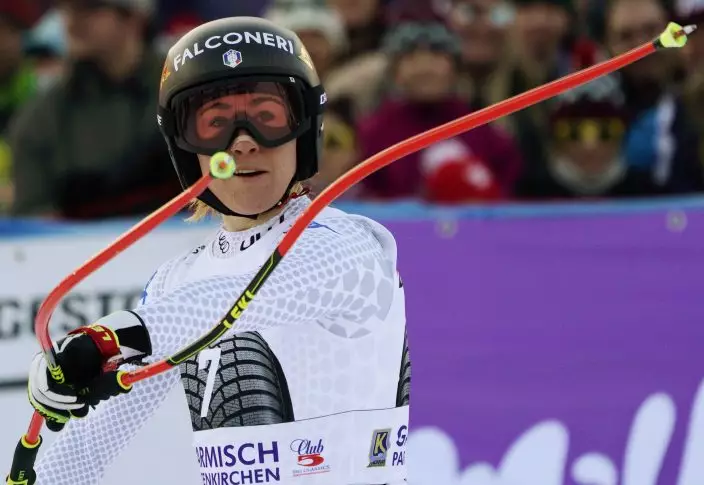
Second placed Italy's Sofia Goggia reacts at finish line after completing an alpine ski, women's World Cup downhill race in Garmisch-Partenkirchen, Germany, Sunday, Jan. 27, 2019. (AP PhotoGiovanni Auletta)
Goggia said her own successful return from injury was overshadowed by Sosio's injury.
"One of my teammates got injured so I have lots of emotions. One is my result, my performance, and the pain and the sadness from this crash," Goggia said. "It's always sad."
Venier finished 0.25 seconds quicker than Goggia, who was also second in Saturday's super-G. Goggia was competing for the first time since she broke a bone in her right ankle while training in October.
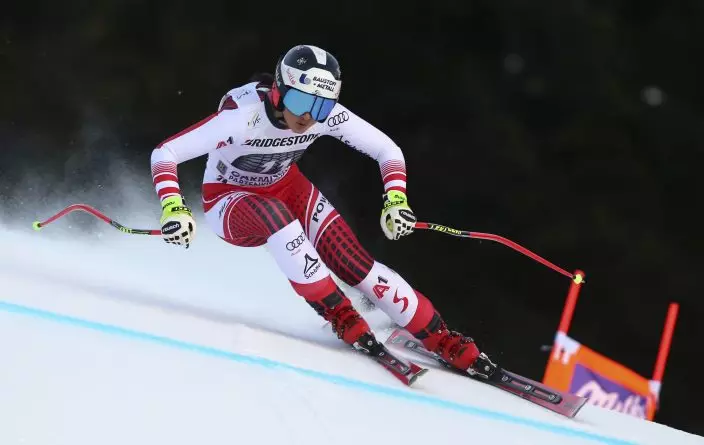
Austria's Stephanie Venier speeds down the course to win the women's downhill in Garmisch-Partenkirchen, Germany, Sunday, Jan.27, 2019 ( Karl-Josef Hildenbranddpa via AP)
"I came here to Garmisch and wanted to take a step forward in relation to my ankle — also with a view to the upcoming world championships. It's not good to set expectations too high. I knew how it felt going into every turn," said Goggia, who only returned to training around two weeks ago. "I'm happy with the progress I made."
Kira Weidle delighted home fans by finishing third, 0.54 seconds behind. She was ahead of Swiss skier Corinne Suter, who was fastest in the first training run Thursday, and Slovenia's Ilka Stuhec, who will defend her world title in downhill at the world championships in Are, Sweden next month.
Venier was third in a downhill at Cortina D'Ampezzo, Italy the previous weekend.
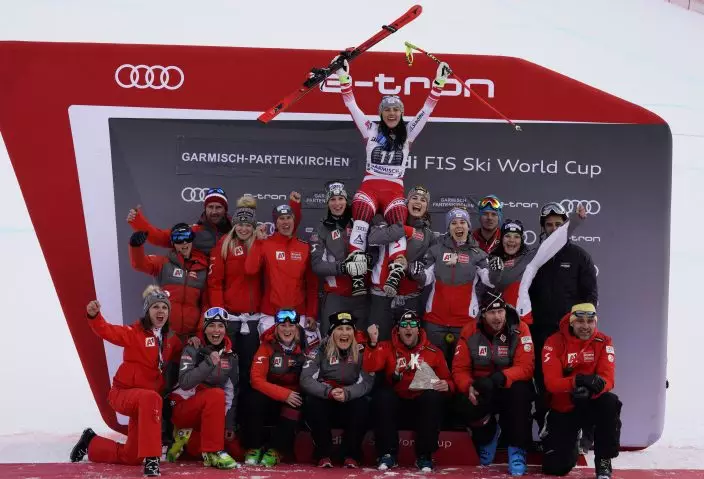
Winner Austria's Stephanie Venier celebrates with her team after completing an alpine ski, women's World Cup downhill race in Garmisch-Partenkirchen, Germany, Sunday, Jan. 27, 2019. (AP PhotoGiovanni Auletta)
"I felt very good today. I was very relaxed at the start, the flat upper part was very agreeable and the jump went very far. I actually had nothing to lose," the 25-year-old Venier said. "I never thought I'd finish ahead of Sofia Goggia."
There was disappointment for Venier's teammates Ramona Siebenhofer, who had been going for her third consecutive downhill win after back-to-back victories in Cortina, and Nicole Schmidhofer, going for her third win of the season.
Schmidhofer, who won Saturday's super-G, finished seventh, 1.03 seconds slower than Venier, with Siebenhofer 1.37 off the pace.
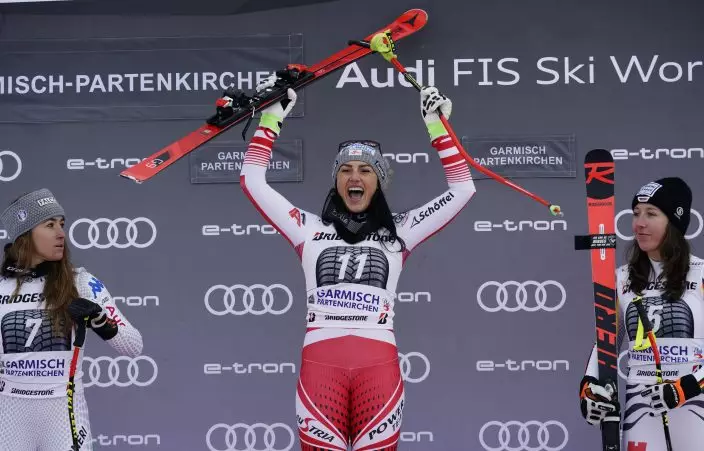
From left, second placed Italy's Sofia Goggia, the winner Austria's Stephanie Venier, and third placed Germany's Kira Weidle celebrate on podium after completing an alpine ski, women's World Cup downhill race in Garmisch-Partenkirchen, Germany, Sunday, Jan. 27, 2019. (AP PhotoGiovanni Auletta)
It was worse still for their teammate Cornelia Huetter, who was one of the first to crash off the course spectacularly, leading to a lengthy delay.
The Austrian team said Huetter suffered a torn ligament in her right knee and a muscle tear in her left calf, ruling her out of the worlds. She had just returned from a five-week injury layoff.
Italy's Nicol Delago set the tone for the race when she crashed wearing the No. 1 bib.
Overall World Cup leader Mikaela Shiffrin skipped the weekend's races and was planning a return in Maribor, Slovenia next weekend before the world championships.
Lindsey Vonn also took a break to give her troublesome knee injury a chance to recover. Vonn had hinted at immediate retirement after failing to finish a super-G in Cortina the previous Sunday.
More AP sports: https://apnews.com/apf-sports and https://twitter.com/AP_Sports
The state of Vermont did not provide adequate oversight to prevent the massive fraud that occurred in ski area and other development projects funded by foreign investors' money through a special visa program, a state audit has found.
The financial scandal first revealed in 2016, which became the state's largest fraud case, shook Vermont and the economically depressed region called the Northeast Kingdom.
In 2018, Vermont's former attorney general asked for an audit of the state's involvement in the projects at Jay Peak and Burke resorts to address the loss of trust in state government from the fraud, State Auditor Doug Hoffer wrote in the report released on Thursday. The audit was completed after the legal proceedings concluded, he wrote.
The findings should not be entirely surprising, Hoffer wrote.
“In short, we found a pattern of misplaced trust, unfortunate decision-making, lengthy delays, and missed opportunities to prevent or minimize fraud,” Hoffer wrote.
Ariel Quiros, a Miami businessman and former owner of two Vermont ski resorts, was sentenced in 2022 to five years in prison for his role in a failed plan to build a biotechnology plant in Newport using tens of millions of dollars raised through the EB-5 visa program. Under the program, foreigners invest $500,000 in U.S. a project that creates at least 10 jobs in exchange for a chance to earn permanent U.S. residency. William Stenger, the former president of Jay Peak, and William Kelly, an advisor to Quiros, each got sentences of 18 months.
But the fraud encompassed seven other projects at Jay Peak and Burke resorts.
In 2016, the federal Securities and Exchange Commission and the state of Vermont alleged that Quiros and Stenger took part in a “massive eight-year fraudulent scheme.” The civil allegations involved misusing more than $200 million of about $400 million raised from foreign investors for various ski area developments through the EB-5 visa program “in Ponzi-like fashion.”
In a Ponzi scheme, money provided by new investors is used to pay high returns to early-stage investors to suggest the enterprise is prosperous. The scheme collapses when required redemptions exceed new investments.
Quiros and Stenger settled civil charges with the SEC, with Quiros surrendering more than $80 million in assets, including the two resorts. In the seven projects at Jay Peak and Burke, “construction was done but not always to the specifications or at the costs told to the investors. Significant funds were simply misused,” the report said.
Under the EB-5 program, the federal government designates regional centers to promote economic growth and oversee and monitor sponsored projects, the report states. Most regional centers are privately owned but the Vermont Regional Center was state government-run.
The center, which was the EB-5 office within the Agency of Commerce and Community Development, had competing duties: to market and promote EB-5 projects and to regulate them, the auditor's report states.
"Experts and policymakers have long warned against such arrangements for fear that an agency relied upon to help a project succeed may be reluctant to exercise its regulatory powers. In addition, a marketing office may not have the skill sets needed to properly regulate complex financial arrangements such as EB-5. Unfortunately, this proved all too true at ACCD,” the report states.
Last July, the state of Vermont agreed to pay $16.5 million to settle all pending and potential lawsuits from foreign investors in the development projects.
The United States Citizenship and Immigration Services is still determining the immigration status of the Jay Peak and Burke investors, Goldstein wrote. At least 424 of 564 Jay Peak investors have already received green cards and the state is working to increase the chances that many more do, she wrote.
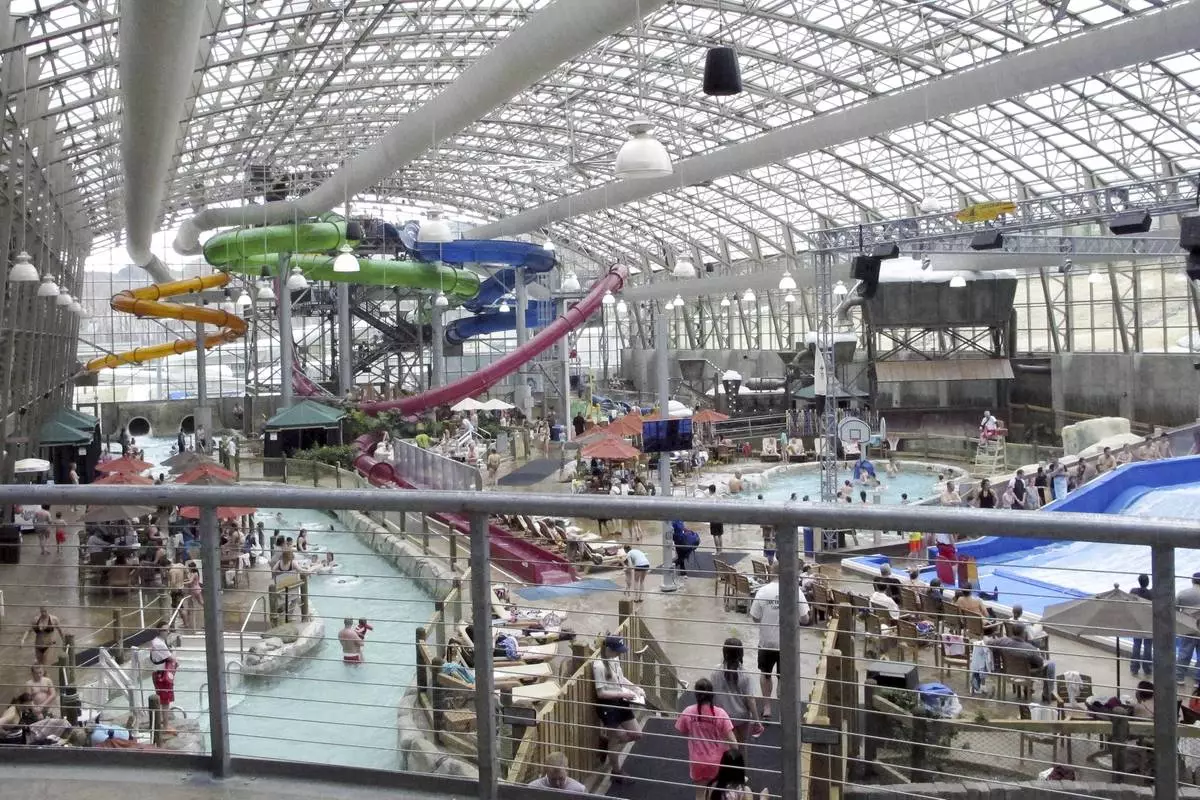
FILE - The water park at Jay Peak resort in Jay, Vt., April 18, 2016. A state audit has concluded Thursday, March 28, 2024, that Vermont did not provide adequate oversight to prevent the massive fraud that occurred in ski area and other development projects funded by foreign investors' money through a special visa program. (AP Photo/Lisa Rathke, File)







